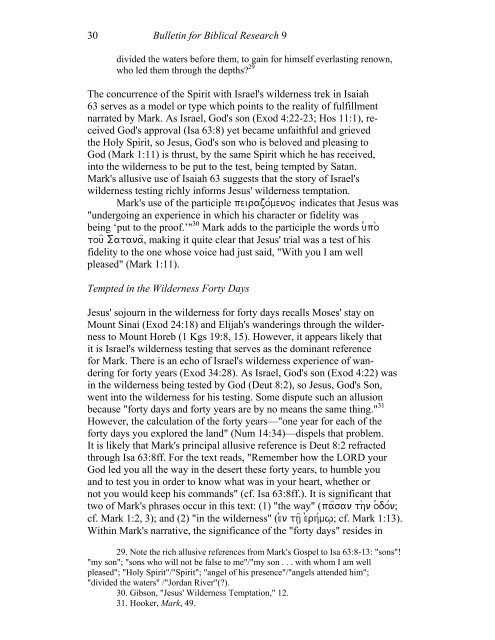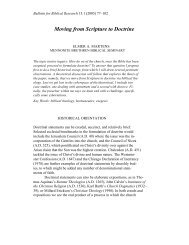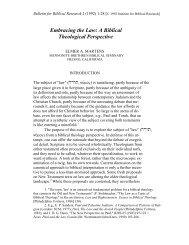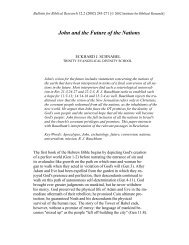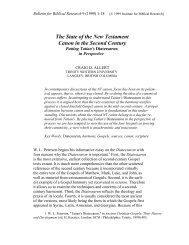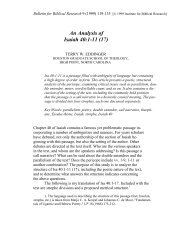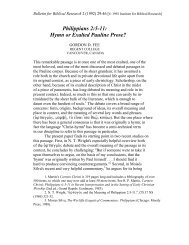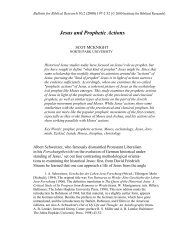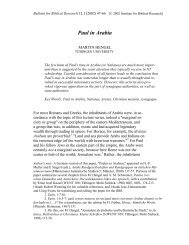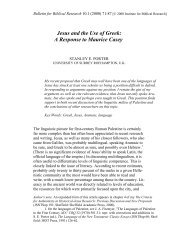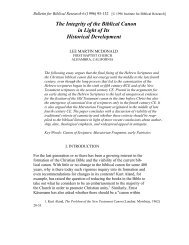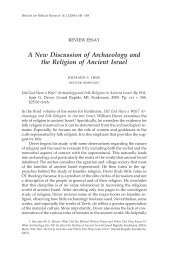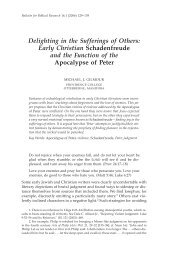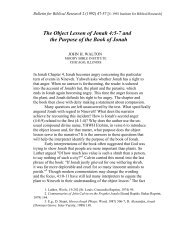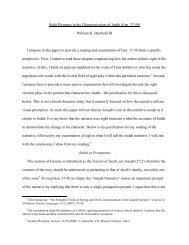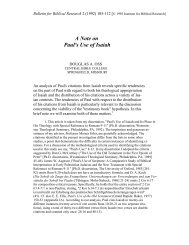Mark's Provocative Use of Scripture in Narration - Institute for Biblical ...
Mark's Provocative Use of Scripture in Narration - Institute for Biblical ...
Mark's Provocative Use of Scripture in Narration - Institute for Biblical ...
You also want an ePaper? Increase the reach of your titles
YUMPU automatically turns print PDFs into web optimized ePapers that Google loves.
30 Bullet<strong>in</strong> <strong>for</strong> <strong>Biblical</strong> Research 9<br />
divided the waters be<strong>for</strong>e them, to ga<strong>in</strong> <strong>for</strong> himself everlast<strong>in</strong>g renown,<br />
who led them through the depths? 29<br />
The concurrence <strong>of</strong> the Spirit with Israel's wilderness trek <strong>in</strong> Isaiah<br />
63 serves as a model or type which po<strong>in</strong>ts to the reality <strong>of</strong> fulfillment<br />
narrated by Mark. As Israel, God's son (Exod 4:22-23; Hos 11:1), re-<br />
ceived God's approval (Isa 63:8) yet became unfaithful and grieved<br />
the Holy Spirit, so Jesus, God's son who is beloved and pleas<strong>in</strong>g to<br />
God (Mark 1:11) is thrust, by the same Spirit which he has received,<br />
<strong>in</strong>to the wilderness to be put to the test, be<strong>in</strong>g tempted by Satan.<br />
<strong>Mark's</strong> allusive use <strong>of</strong> Isaiah 63 suggests that the story <strong>of</strong> Israel's<br />
wilderness test<strong>in</strong>g richly <strong>in</strong><strong>for</strong>ms Jesus' wilderness temptation.<br />
<strong>Mark's</strong> use <strong>of</strong> the participle peirazo/menoj <strong>in</strong>dicates that Jesus was<br />
"undergo<strong>in</strong>g an experience <strong>in</strong> which his character or fidelity was<br />
be<strong>in</strong>g ‘put to the pro<strong>of</strong>.’" 30 Mark adds to the participle the words u(po_<br />
tou= Satana=, mak<strong>in</strong>g it quite clear that Jesus' trial was a test <strong>of</strong> his<br />
fidelity to the one whose voice had just said, "With you I am well<br />
pleased" (Mark 1:11).<br />
Tempted <strong>in</strong> the Wilderness Forty Days<br />
Jesus' sojourn <strong>in</strong> the wilderness <strong>for</strong> <strong>for</strong>ty days recalls Moses' stay on<br />
Mount S<strong>in</strong>ai (Exod 24:18) and Elijah's wander<strong>in</strong>gs through the wilderness<br />
to Mount Horeb (1 Kgs 19:8, 15). However, it appears likely that<br />
it is Israel's wilderness test<strong>in</strong>g that serves as the dom<strong>in</strong>ant reference<br />
<strong>for</strong> Mark. There is an echo <strong>of</strong> Israel's wilderness experience <strong>of</strong> wander<strong>in</strong>g<br />
<strong>for</strong> <strong>for</strong>ty years (Exod 34:28). As Israel, God's son (Exod 4:22) was<br />
<strong>in</strong> the wilderness be<strong>in</strong>g tested by God (Deut 8:2), so Jesus, God's Son,<br />
went <strong>in</strong>to the wilderness <strong>for</strong> his test<strong>in</strong>g. Some dispute such an allusion<br />
because "<strong>for</strong>ty days and <strong>for</strong>ty years are by no means the same th<strong>in</strong>g." 31<br />
However, the calculation <strong>of</strong> the <strong>for</strong>ty years—"one year <strong>for</strong> each <strong>of</strong> the<br />
<strong>for</strong>ty days you explored the land" (Num 14:34)—dispels that problem.<br />
It is likely that <strong>Mark's</strong> pr<strong>in</strong>cipal allusive reference is Deut 8:2 refracted<br />
through Isa 63:8ff. For the text reads, "Remember how the LORD your<br />
God led you all the way <strong>in</strong> the desert these <strong>for</strong>ty years, to humble you<br />
and to test you <strong>in</strong> order to know what was <strong>in</strong> your heart, whether or<br />
not you would keep his commands" (cf. Isa 63:8ff.). It is significant that<br />
two <strong>of</strong> <strong>Mark's</strong> phrases occur <strong>in</strong> this text: (1) "the way" (pa=san th_n o(do/n;<br />
cf. Mark 1:2, 3); and (2) "<strong>in</strong> the wilderness" (e)n th| = e)rh/mw|; cf. Mark 1:13).<br />
With<strong>in</strong> <strong>Mark's</strong> narrative, the significance <strong>of</strong> the "<strong>for</strong>ty days" resides <strong>in</strong><br />
29. Note the rich allusive references from <strong>Mark's</strong> Gospel to Isa 63:8-13: "sons"!<br />
"my son"; "sons who will not be false to me"/"my son . . . with whom I am well<br />
pleased"; "Holy Spirit"/"Spirit"; "angel <strong>of</strong> his presence"/"angels attended him";<br />
"divided the waters" /"Jordan River"(?).<br />
30. Gibson, "Jesus' Wilderness Temptation," 12.<br />
31. Hooker, Mark, 49.


